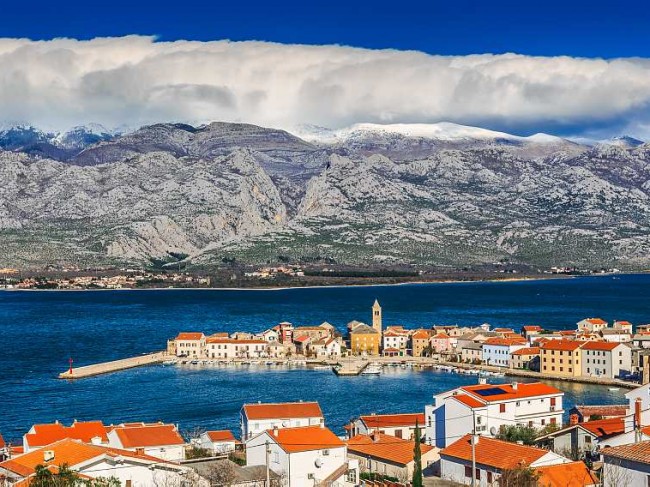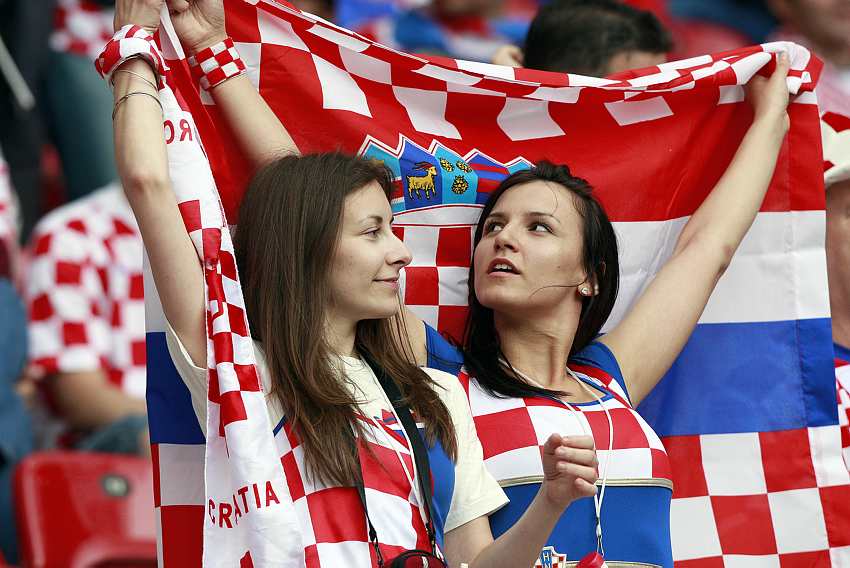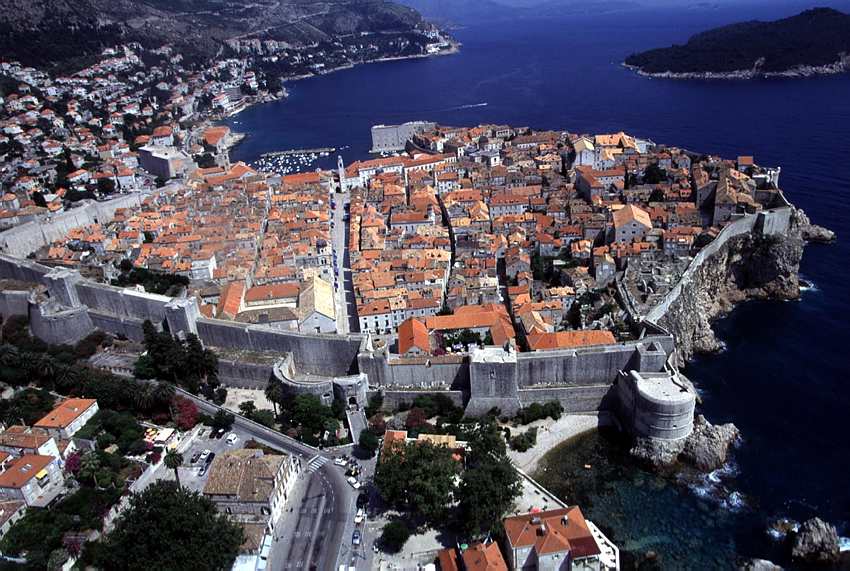



What do a Bulgarian a Hungarian and a Chinese student speak when they all sit down for coffee, Croatian, of course. Adrienn Rónai a student from the University of Pecs, Hristo Bojadzijev from the Sofia University of St. Clement of Ohrid and Xiaoou Wang from the Peking University of Foreign Languages all have something in common, and that is they are all studying Croatian. Our reporter, Bruno Lucic, caught up with the three students whilst they were attending a two–week seminar in Dubrovnik of Slavic Studies at the Inter University Centre. Why are they studying one of the most difficult languages in Europe, what are their plans for the future and which stereotypes are true and which are urban myths.
You have all been to Croatia many times before; do you prefer life in the slow lane on the Adriatic coast or the urban centres, such as Zagreb?
Adrienn: I prefer the Mediterranean along the coast. But I also like Zagreb, but to be honest I prefer to be by the sea.
Xiaoou: This is my second time in Dubrovnik. When I studied in Zagreb, I made a lot of friends, and one of these friends comes from Dubrovnik. I have spent some time with her at her home here.
Hristo: I was in Zagreb because I got a scholarship for a semester. I have also ridden a bicycle twice across most of the country. I’ve been to so many places in the country that I can’t remember all of their names.

So the answer that we all want to know, why did you all decide to study Croatian
Hristo: Quite by accident. I didn’t really have an idea of what to study so I plumped on “South Slavic Studies.” This theme includes Serbian, Slovenian and Croatian language and literature.
Adrienn: I started studying Hungarian language and literature at the University of Pecs in order to become a professor. However, I was obliged to study two subjects so I decided to choose Croatian language and literature as my second choice. I guess I decided on Croatian because my grandmothers were half-Croatian. They did not come from Croatia but were born in Hungary. We didn’t used to speak Croatian at home but then my father got a job in Zagreb and the family moved to the Croatian capital, we still don’t speak Croatian at home. I started learning Croatian at elementary school there and when we moved back to Pecs I went to a bilingual Hungarian-Croatian school.
Xiaoou: In 2009 I got a scholarship for a year at the Zagreb Faculty of Philosophy. But before that, I had already started learning Croatian in Beijing. The renowned Croatian pianist Maksim Mrvica is extremely popular in Asia, so I can honestly say that the reason I enrolled in a Croatian language course was because of him. My first teacher in Beijing gave me a Croatian name “Tena.”
What is the most difficult thing about learning Croatian, which parts have given you the most headaches?
Adrienn: I must admit that I really like the Croatian language, but the hardest part is learning the different genders. Whenever I speak, I speak in the masculine gender. So, genders and cases are the hardest. I think I should know more words, to have a richer vocabulary.
Xiaoou: Everything was difficult. Chinese is a completely different language; we do not have grammatical cases and genders. At the beginning it was very difficult and I wondered why I had to change the verbs for each subject. In Chinese we only speak with the infinitive form of the verb. When I get tired I have problems remembering all the different cases in Croatian.

What did your friends say when you told them that you were studying Croatian?
Adrienn: They, and in fact everyone, is always surprised when I tell them what I am studying. When I say Croatian and Hungarian I am always asked why Croatian? Then I tell them it’s because of my family roots, because I’m interested and because I used to live in Zagreb. Then they ask me if there is a future and how I will be able to use? I think there are opportunities because I’m interested in working in translation. Although, yes, my friend are surprised because in Hungary it isn’t popular to learn a foreign language that isn’t widespread and global.
Xiaoou: They ask me, with a look of surprise, Croatian!? People often don’t know where Croatia is! Then I have to explain that Croatia was once part of Yugoslavia. The Chinese people who have been to Croatia, always remark that is very beautiful and all they want to visit again. Since Croatian is regarded as a “little language” in China there are enrolments every four years, but there is always lots of competition for the few places available.
Which stereotypes about Croatia are truths and which are myths, what experience have you seen travelling throughout the whole region?
Adrienn: To be honest there aren’t that many stereotypes for Croats, however Bosnians and Serbs tend to get angry quickly and they are more temperamental. For the Croats who live in the continental part it is often said they are nationalists, but in a positive way because it’s important to love your country. And as far as Dalmatians are concerned I would say that they really know how to enjoy life.
Hristo: In general Bulgarians think that Croatia is more inclined towards Europe and the European and Mediterranean culture. We tend to know more about Serbia, as they are our neighbours. With older people in Hungary you will still hear them use the word Yugoslavia instead of Croatia or Serbia.

Have you managed to discern some localisms or feel the difference in speech between continental and coastal parts of Croatia? Have you managed to learn some words in Dubrovnik dialect?
Hristo: I see and hear so many tourists here that it is difficult to discover who is from Dubrovnik, and who is not. But with the Croatian I have heard here it seems that people speak slower and louder.
Adrienn: I really like the dialect in Dubrovnik, it seems to me that they put the emphasis on different parts of the words and I love it. It is interesting that the words are pronounced a little longer than in other regions of the country.
Xiaoou: I prefer the dialect in Zagreb. It sounds to me that people are arguing here, although they probably aren’t.
What do you like about Dubrovnik and what bothers you?
Adrienn: I like the old city the most, the cultural heritage and the sea. What I do not like is the fact that Dubrovnik is full of tourists and the local citizens are nonexistent. It is always crowded and I could not live there. I would be able to live in Cavtat, for example, because it is quieter. I love the sun and prefer the climate here.
Xiaoou: I also like the culture and the old city. I love the sea and the beaches but the most important point of being here is the opportunity to practise my Croatian. Yes, there are too many tourists and it reminds me of China and Beijing. I was on the bus here in Dubrovnik the other day and everyone started to push and shove, just as I am used to in Beijing.

Do you think that life in Croatia is slower than what you are used to?
Xiaoou: Well, when I arrived in Zagreb I had to go to the police to solve a document and I waited half a day and when the woman finally arrived at the desk she told me that it was her break time. Life here seems very slow and in Beijing probably too fast. In Beijing, I always write notes in a book to remind me what to do and a time plan for the day, I quickly realised that that doesn’t work here. Friends in Croatia always say “slowly, do not rush.” In Beijing, we don’t drink coffee as often and as long as people do in Croatia.
Hristo: Yes I am also surprised how much coffee people drink in Croatia. When I saw it in Zagreb for the first time I was a little shocked because the bars are constantly full.
When will you come back to Croatia again?
Hristo: I hope very soon.
Adrienn: Every year I go shopping with my mum to Zagreb.
Xiaoou: I will come again because my boyfriend is a Croat.**
Interviewer: Bruno Lucic / Dubrovnik Times
